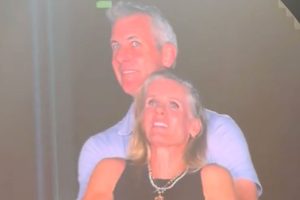Late in Andrea Dorfman’s drama Heartbeat, now on the Canadian festival circuit, one character tells another, “I guess a broken heart can make great art.” It is an apt phrase to sum up the recent success of the Nova Scotia-based Jewish director.
Dorfman has thrived over the past decade with a collection of poignant personal projects, from inspiring animated shorts that are odes to lonely hearts, to the feature Heartbeat, which had its world premiere at the Toronto International Film Festival on Sept. 6.
“I find that any time you have a surge of emotion or a breakdown… as an artist, you’re going to find material there,” Dorfman tells The CJN. “Coming out of breakups, I’ve always found that I’ve gone through an incredible time of inspiration and renewal.”
Dorfman worked on some of these inspiring projects with singer-songwriter and former Halifax Poet Laureate, Tanya Davis. The viral video, How to Be Alone, directed by Dorfman and featuring Davis, has racked up close to seven million views on YouTube. Heartbeat is the latest collaboration and earned the Jewish-Canadian director some of the best notices of her career.
The film also marks Davis’ first starring role, while she also provides much of the film’s soundtrack. “Tanya is such a professional and such an amazing performer,” Dorfman says. “I feel like there needed to be other outlets to get her music and poetry out to the world. It’s just so beautiful.”
How to Be Alone could also have been a working title for Heartbeat. The drama centres on Justine (played by Davis), a newly single woman searching for meaning in her life as she tries to overcome a paralyzing stage fright.
Shot in Halifax, Heartbeat stars a number of local musicians, including Stephanie Clattenburg, Rich Aucoin and former April Wine bassist Jim Henman. Among that talent was Davis, whose poems and songs the filmmaker was an unabashed fan of before they became creative partners.
However, Dorfman says that distributors wanted the singer-songwriter to only provide the music and give a more recognizable star the lead role. The success of How to Be Alone, which spawned a book deal, helped to reassure Telefilm Canada that Davis could headline the drama.
“I always felt very strongly that Tanya would be the actual performer in the film,” Dorfman says. “There’s nobody else who can sing Tanya’s music.”
Dorfman was born in Toronto, but has lived in Halifax for 20 years. The Atlantic town shines in the film, its painted houses and rolling hills giving the location a personality that the director says she loved. “We didn’t have money to paint backdrops and create studio sets, so I think what was there was gorgeous,” Dorfman says.
The Halifax resident says she has no reason to abandon the East Coast. “It’s a really great place to get work done. There isn’t a lot else to do, and you don’t necessarily want to be outside. As an artist, as a filmmaker, it’s great.”
Heartbeat marks the first feature in 11 years for the 45-year-old filmmaker. She took a hiatus from filmmaking after her 2003 romantic comedy Love That Boy, and began to focus on animation.
Working for the National Film Board of Canada, Dorfman created many shorts that premiered at film festivals across North America. She also earned an Emmy nomination, for the 2010 animated short Flawed. For several of these titles, Dorfman says she wanted complete control, which was easier to get with a small staff and budget.
Heartbeat also features some of Dorfman’s animation, which tells the story of what is happening to Justine’s heart at different points during her creative journey.
However, moving back to features meant that the director had to get out of her comfort zone. She says that pitching her project to cast and crew members was not an easy thing to do.
“I’m not naturally good at [convincing people],” she says. “To pitch it over and over again… in different ways to different people and to pitch it with confidence. That, for me, was the biggest challenge [in making the film].”
What the heart needs, though, the heart gets. And with such support and accolades for this new film, it seems that Dorfman’s one-liner about broken hearts really does ring true.






